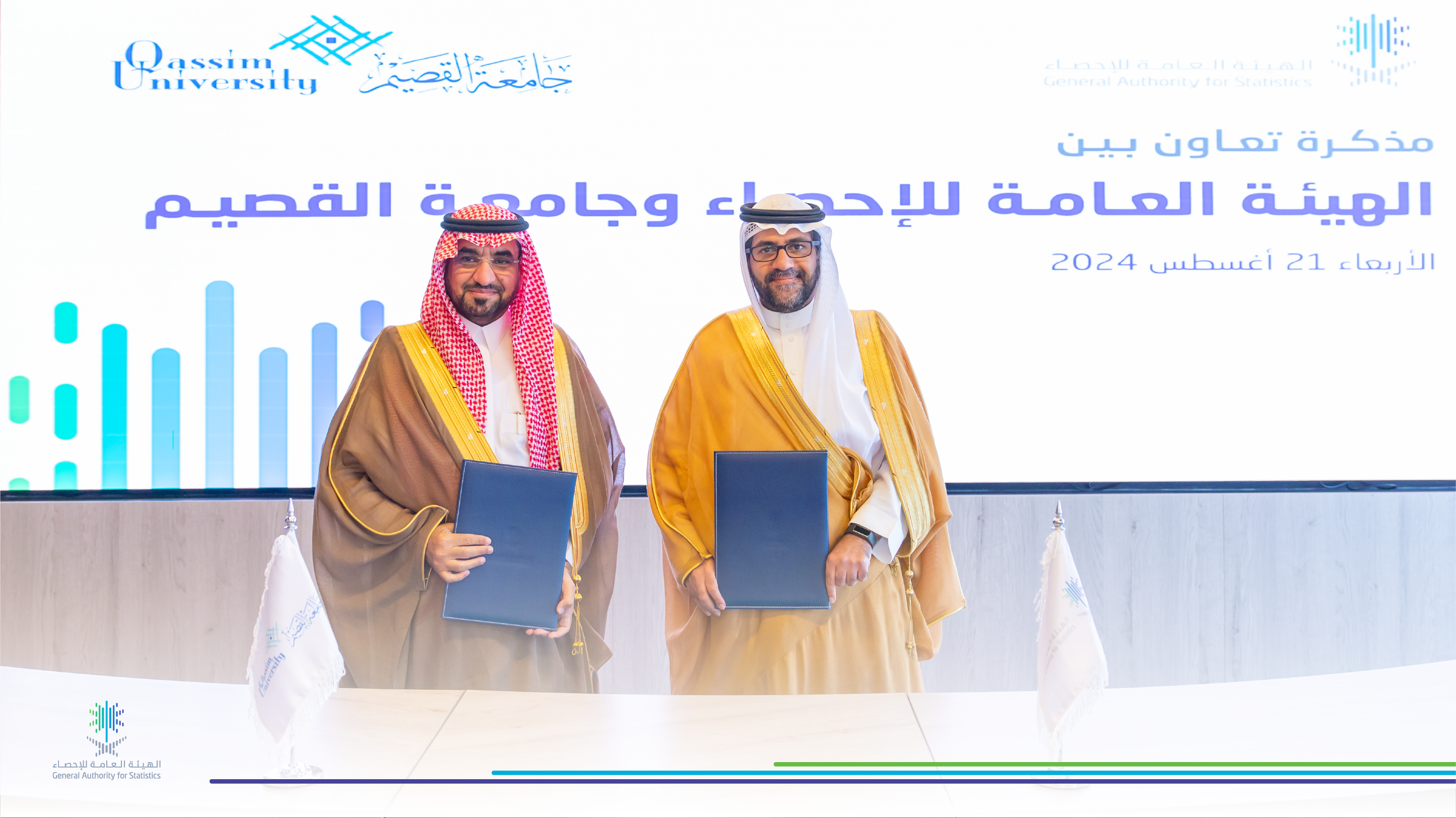
GASTAT signs a memorandum of cooperation with Qassim University
22-08-2024
The General Authority for Statistics (GASTAT) signed a memorandum of cooperation with Qassim University aimed at enhancing collaboration, improving coordination, and integrating efforts in their respective fields. The agreement also includes joint research initiatives between the two parties. It was signed by Dr. Fahad bin Abdullah Aldossari, President of GASTAT, and Prof. Mohammed bin Fahad Alsharekh, President of Qassim University.
The agreement covers several areas, such as collaboration in developing and supporting academic programs focused on statistics, conducting external reviews of curricula, and providing researchers with access to interactive maps for estimating and analyzing statistical data. It also includes cooperation in data sharing, statistical indicators, and the execution of statistical surveys, along with the organization of lectures, seminars, and workshops in statistics and related disciplines. Furthermore, the agreement offers opportunities for cooperative and summer training for university students.
In this regard, Dr. Fahad Aldossari, President of GASTAT, highlighted that statistical work plays a vital role in achieving the goals of the Kingdom’s Vision 2030 by establishing and assessing statistical indicators. He pointed out that the collaboration with Qassim University aids in tracking progress towards national goals and sustainable development targets through joint efforts to improve data exchange performance, address the needs of both parties, and stay abreast of statistical advancements in scientific research and future trends for developing statistical products that bolster the national economy and sustainable development. The partnership also seeks to enhance community awareness and understanding of various sectors and their activities.
It is worth noting that the General Authority for Statistics is the official entity responsible for statistics in the Kingdom, serving as the sole official reference for conducting statistical work and supervising its technical and organizational aspects. GASTAT tasks include collecting statistical data and information from public and private entities as well as individuals, in addition to analyzing and studying this data to calculate various statistical indicators. GASTAT also provides consultancy and statistical reports for surveys and research, among other data and statistics services within its scope of work.
Qassim University, in turn, is dedicated to achieving its educational and scientific goals and strategic plans, playing a significant and active role in development efforts by building bridges of cooperation with government entities across various sectors. The university aligns with the Kingdom's ongoing development in all fields, channeling its efforts to enhance the nation's status and support the continuous work towards achieving Vision 2030.

GASTST launches Saudi Statistician Program to attract national talents
05-08-2024
The General Authority for Statistics (GASTAT) invites graduates from the statistics and mathematics departments, along with several other specializations, to join the Saudi Statistician Program. This initiative aims to attract young national talents to develop a distinguished cadre of national specialists in the field of statistics, enabling Saudi youth with expertise in the field of statistics to contribute to GASTAT’s national role.
GASTAT emphasized that this initiative aligns with the ongoing efforts to empower university graduates, enhance their capabilities and skills, and add value to the statistical sector. It aims to build a generation capable of supporting statistical activities and national institutions in both the public and private sectors, recognizing the critical role of the sector in aiding policy and decision makers.
In this context, GASTAT outlined several stages for joining the program. These include employing recent graduates to work directly at GASTAT for one year, during which they will receive intensive training in statistical work. This is followed by sponsoring them to pursue a master's degree. The program, open for applications until August 29 of this year, specifies the required specializations: statistics, mathematics, big data and analytics, economics, data science, quantitative methods, and data engineering.
It is noteworthy that GASTAT aims to achieve achieve leadership and advancement in the statistical sector, striving to be the most distinguished and innovative statistical reference to support social and economic development in Saudi Arabia, following the best international standards and practices.
GASTAT: Real estate prices increase by 1.7% in Q2 2024
01-08-2024
According to the General Authority for Statistics, real estate prices in Saudi Arabia increased by 1.7% in the second quarter of 2024 compared to the same quarter last year. This rise is attributed to a 2.8% increase in residential real estate prices, according to the report published today by the General Authority for Statistics.
The report also revealed that residential land prices increased by 2.8% year-on-year due to the significant impact of the residential sector on the rise in real estate prices in the second quarter of 2024 compared to the same period in 2023. The residential sector experienced a 2.8% increase in the second quarter of 2024, while prices for residential buildings rose by 0.1%, villas by 0.5%, and houses by 1.4%. Meanwhile, apartment prices saw a 2.9% increase.
On the other hand, commercial real estate prices saw a 0.4% decline, influenced by a 0.4% decrease in commercial land prices. Prices for commercial exhibitions dropped by 0.6%, while prices for commercial buildings and centers remained stable in the second quarter of 2024, with no significant changes. In contrast, the agricultural sector experienced a 1.5% increase due to a 1.5% rise in agricultural land prices.
The Real Estate Price Index is based on administrative data from the Ministry of Justice concerning real estate transactions. It serves as an essential tool for helping authorities make informed economic and statistical decisions about real estate price trends and future projections. The index encompasses three primary sectors, each with distinct real estate categories: the residential sector (which includes land plots, buildings, villas, apartments, and houses), the commercial sector (which includes land plots, buildings, exhibitions, shops, and commercial centers), and the agricultural sector (which covers only agricultural land).
Non-oil activities grow by 4.4% during Q2 of 2024
31-07-2024
The General Authority for Statistics released the real GDP Flash Estimates Publication for Q2 of 2024. According to the publication, there was a growth of 4.4% in non-oil activities and 3.6% in government activities, while the real GDP shrank by 0.4% from the Q2 of 2023, the 8.5% drop in oil-related activities was a contributing factor.
In contrast to Q1 of 2024, the seasonally adjusted real GDP increased by 1.4% in Q2 of 2024.